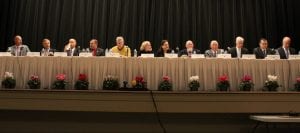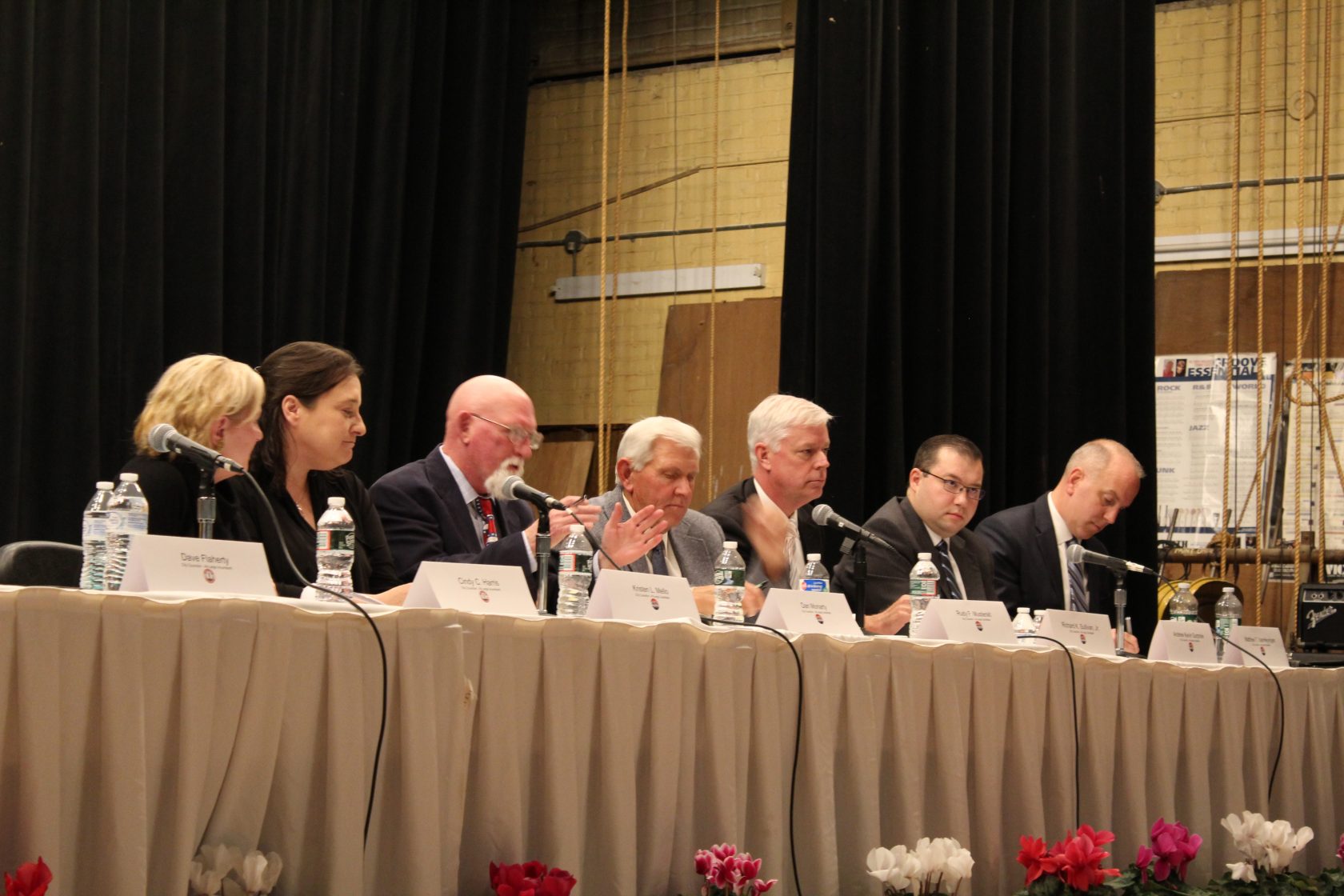
Twelve At-Large City Council candidate participate in a Candidate Forum Oct. 30 sponsored by The Westfield News and Greater Westfield Chamber of Commerce. Photo by Dennis Hackett
WESTFIELD – Twelve candidates for seven at-large seats on the Westfield City Council responded to a series of questions Oct. 30 during a Candidate Forum that included an opportunity to list their priorities as a councilor, discuss thoughts on taxes and their feelings on restrictions to marijuana facilities.
The forum was sponsored by The Westfield News and Greater Westfield Chamber of Commerce at Westfield Technical Academy.
After the opening statements, the first question posed was regarding the marijuana industry being highly regulated by the state. Moderator Hope E. Tremblay, editor of The Westfield News, asked what the candidate’s positions are on local restrictions on marijuana facilities.
Candidate James R. Adams said that he previously served on the City Council when the decision was made as to where in the city the facilities should be located. He said they voted for the airport industrial area, and not downtown. He said currently there are four licenses available, with two facilities close to opening. “Let’s open one first,” he said, adding that h was personally against it, because in the Firtion-Adams Funeral Home, he sees one person a day fall victim to the opioid epidemic.
Incumbent Daniel Allie said he didn’t support the marijuana question either. He said for one it was 28 pages long, and most people didn’t understand it allowed for edibles. But voters approved, and he agreed with Adams that allowing four businesses is sufficient.
Incumbent Brent B. Bean, II said the voters approved it, he was for it, and still is. But he said the Commonwealth saw the money and ran for it, and are still playing catch up. “I think it’s a complete mess,” he said. He said two of the four slots are sited, and some councilors have proposed opening up more.
Incumbent Matthew Emmershy said the residents voted this in; to allow marijuana in Westfield in heavily regulated dispensaries. He said people who smoked before are still smoking. “I was the sole vote against restricting it from downtown,” he said. He talked about the thriving businesses in Northampton and Easthampton, and said there is no reason Westfield couldn’t do the same.
“I really could care less what people do in their own homes,” said Incumbent David Flaherty, who said he was libertarian in this regard. However, he said he didn’t vote for it, was against recreational use, and thinks the Council should see what the places that already have licenses do before making any changes.
Incumbent Cindy C. Harris said the citizens voted for this, although she did not personally. She said she doesn’t agree with expanding Westfield’s current zoning, and agreed when Flaherty said it would be an unfair advantage to new businesses to give them more zoning options.
Candidate Kristen L. Mello said it’s tricky to talk about locations for marijuana when alcohol is sold all over the place. She said if it were up to her, she would send councilors out with Law Department guidance to come up with the best proposal, and let the voters decide.
Candidate Dan Moriarty said that’s what zoning is about; going through the Planning Board, Community Development and City Council, so you can restrict locations. “I don’t see an issue with using a system that exists to set some parameters,” Moriarty said.
Candidate Rudy Musterait said local facilities pertinent to downtown have to be looked at, adding that it would be nice to have more business downtown.
Candidate Rick Sullivan said Massachusetts is the most highly regulated state, and he has faith in the Attorney General and Cannabis Control Committee. He thinks the city did a good job of zoning, and they are trying to bring residents in to the downtown. “We need to get four up and running,” he said, before making changes.
Incumbent Andrew K. Surprise said zoning is an issue with marijuana, which is not just about retail and growing. He said the downtown needs to change. “We’re losing a revenue source,” he said, adding that the city needs $5 million a year for roads.
Candidate Matthew T. VanHeynigen said he was a member of the Planning Board, and participated in the zoning regulations. “I would be opposed to locating marijuana downtown due to schools,” he said. He also believes the market could reach the saturation point..
Tremblay then asked, if elected, what would be the candidates’ priorities for the city.
Flaherty said to do what’s best for the city, which he said is approaching the tax levy limit. He said even with bringing more business into town, it hasn’t changed. He said he doesn’t like rushing things through the City Council. He’s in favor of openness, clean government, having all meetings and subcommittees broadcast.
Harris said she has many concerns, first among them supporting the “great police, fire and first responders.” She also said, “Your wallet,” adding that she’s the only one who every year makes a motion for the lowest tax rate possible for residents. She said schools should receive more funding from the state, and said the city has received $1 million towards expenses for water, with more to come.
Mello said her priority is to end the PFAS exposure completely and to protect public health.
Moriarty said when he talked to people at the supermarkets, the biggest answer they gave to the question comes down to 84% of the city budget going to salaries, and 16% to services. He gave the example of filling up his recycling bin but not his garbage can for the once a week pickups, and how there may be some way of changing the schedules. “Do more with less,” he said.
Musterait said his top priority would be the roads. “Everybody uses the roads. We need better roads that last,” he said, adding that the city has been repairing the roads the same way for the last 40 to 50 years. As an environmentalist, he suggested looking at using recycled plastic mixed with concrete aggregate; looking to the future to build roads that last.
Sullivan said the city needs to grow through new businesses. He said businesses are not coming into the region or the city because they can’t find the talent to build the workforce. He said he is a big supporter of the superintendent’s new career pathways at Westfield High School in engineering, public safety, which he serves on the advisory board; medical and hospitality.
Surprise said his first priority is the PFAS water contamination.Surprise said his second priority is roads, and funding the stabilization fund, and his third priority is taxes.
VanHeynigen said his priorities are development, schools and infrastructure, starting with water.
Adams said the city needs to get creative with projects, and cited projects that he had done with Montgomery Fish & Game that brought in $3 million, and a towing contract that he worked on with Chief Camerota that raised $1 million.
Allie listed good schools, good roads, controlling spending and a transparent use of tax dollars. He said the mayor asked for a level budget, and it went up by $3.7 million, while the city needs to spend $7 million on roads over the next 15 years.
“Business has been a priority for me,” said Bean, however, he said he wants the constant devaluing of city employees and the school department to end, such as holding contracts up for a 1% raise. He also said a new high school was his number one priority 11 years ago, and building a new one still is.
Emmershy said his priorities are taxes. He said the payroll has gone up 17% in three years, and it’s not about giving employees a 1% raise. “It’s about how we’re spending, and who we’re giving it to,” he said. He also said there is $5 million on Free Cash, which the residents have been taxed on and hasn’t been spent. He also mentioned transparency and maintaining the Cabot Road site.
Candidates were asked what are their positions on the split tax rate and how would they promote business development in the city.
Musterait said business development lies with small businesses, and keeping dollars local.
Sullivan also said it’s a balance, and the entire burden can’t be put on the commercial/industrial sector which provides jobs. Regarding business development, Sullivan said Twiss Street is ready to go, and there are not many buildable properties like that one that are shovel-ready in the state. He also mentioned developing the downtown Elm Street property.
Surprise said taxes are too high, and the new auditor said the city is three to five years away from hitting the levy ceiling. He said they can’t raise them more for working families and seniors on fixed incomes, where taxes outpace the income they’re bringing home. Surprise said he is a fan of the work done to bring Myers Info Systems to town, and is fine with tax incentives (TIFF) for small businesses.
VanHeynigen said he would not adjust the tax rate. He believes it’s the face that the city is putting out there, and the way the Council has conducted itself that is the problem. He would streamline the process for businesses. He also said they need professionalism on the council.
Adams said during the 10 years he served on the City Council, he was always the voice of business, and doesn’t agree with the split tax rate. “I know how many thousands of dollars I give to the city,” he said, and asked what they would do without Advanced Manufacturing and other companies.
Allie agreed that the split tax rate is not the answer. He said the tax rate is based on the assessed value, and said the city should think about having an elected assessor.
Bean said with the split tax rate, it would be too much of a burden on residents to change to a single tax rate at this point. He said the council has a problem with paralysis, no one wants to make a decision, which is the way they treat businesses.
Emmershy also said there was no way the city could go to a single tax rate at this point. He said the biggest issue is to control spending, and not dump on the businesses or the residents. He also said the city’s master plan for business development is 50 years old and outdated.
Flaherty , who used a poster with a graph to show the levy limit, said new growth has been from $800,000 to $1.2 million a year. “Even with new projects, there’s not necessarily more money,” he said.
Harris said she has been a strong proponent of keeping the tax shift on businesses, which include billion dollar companies that aren’t going anywhere. “Unfortunately, it’s also on small businesses,” she said, adding that she has proposed a small business tax rate which has not passed. She said she is an advocate for the homeowner.
Mello said she would like to see the city make the revenue in new growth. She said the country is at the beginning of an enormous problem with PFAS, and the city should be setting up pilot programs and inventing businesses around it.
“Obviously, you want industrial/commercial growth,” said Moriarty. He said it cost the city $5,000 to $6,000 per child, and for a family with four kids paying $8,000 in taxes, the city invests $16,000. He said parents shop around, and choose locations because of public safety and quality of life. He called them competing values, and asked, “Which do you water first?”








